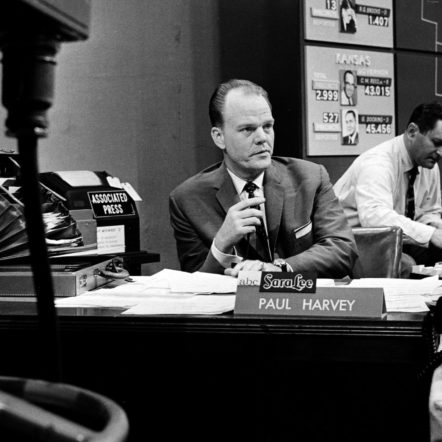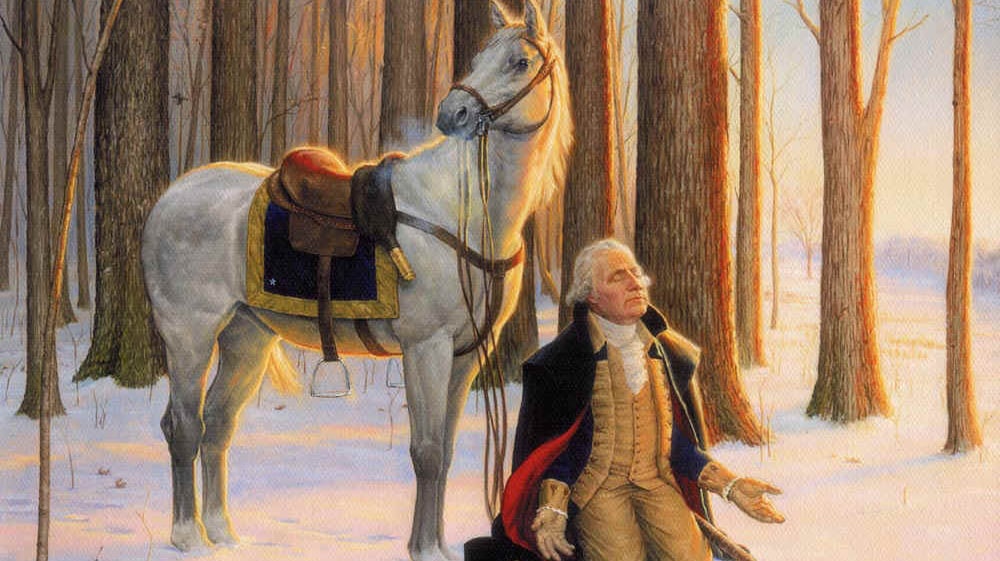When Paul Harvey Aurandt entered the world on September 4 in 1918, America was on top of it. We were about to emerge from World War I as a global power, surpassing Britain for the first time as the nation with the highest per capita income. The unprecedented prosperity of the 1920s combined with a boundless optimism to produce a nation pulsing with pride, patriotism, and promise.
Decades later, after a Great Depression and a Second World War, Americans needed to be reminded of important bedrock principles—the ones that brought us through good times and bad even as our understanding of them had begun to fade. Shortening his name to simply Paul Harvey, the man from Tulsa with the golden voice fulfilled that assignment as well as anyone in the second half of the 20th Century.
The first line of the Paul Harvey Wikipedia page describes him in the same concise and pithy fashion for which his radio broadcasts were known: “famous for his idiosyncratic delivery of news stories with dramatic pauses, quirky intonations, and many of his standard lead-ins and sign offs.”
I’m confident that millions of Americans over the age of 40 will agree with me when I say Paul Harvey was one of a kind. We remember the sound of his unique, mesmerizing delivery as if he were on the radio only yesterday, though he died almost twelve years ago at the age of 90.
‘Hello, Americans’
In their biography, Paul Harvey’s America: The Life, Art, and Faith of a Man Who Transformed Radio and Inspired a Nation, Stephen Mansfield and David Holland note that as many as 24 million listeners per week tuned in to Harvey’s radio program (dubbed Paul Harvey News and Comment) from 1951 to 2008. The distinctive opener, “Hello, Americans!,” immediately brought us to attention. We knew “that whatever words followed that cheery greeting would be interesting, authentic, and delivered with a captivating, almost musical artistry.”
One need not agree with Harvey on everything to recognize that he was a deeply thoughtful American patriot; a devoted Christian; a family man of remarkable, unblemished character; and a lover of liberty. The Foreword to the Mansfield/Holland biography notes,
Paul Harvey understood that America is unique in human history, a nation founded in a vision of freedom that was new in the world at the time. He was right when he located the greatness of America in the character of her people, in their industry, and in the goodness of their hopes. He knew that it was sacrifice and hard work that had made America strong. And he knew something else too. He knew what Alexis de Tocqueville had come to understand: that if you search for the meaning of America, you must look not so much in her halls of government as in the pews of her churches.
Paul Harvey was born two years prior to the airing of the world’s first commercial radio broadcast but radio would be his life’s passion from his teenage years on. As proof of his popularity, look no further than this remarkable fact: At age 82, he signed a ten-year contract with a major broadcasting network that paid him $10 million per year. Advertisers knew that being associated with Harvey was golden.
Below this essay, I will post links to several of Paul Harvey’s most memorable messages, including his famous 1965 warning to America titled “If I Were the Devil.”
A Sample of Paul Harvey
From both his radio broadcasts and his numerous newspaper columns, I present here a print sample of his wisdom—a mix of common sense, optimism, clean humor and, if you will, what I think he might proudly call “Americanism.” I hope they bring a smile to your face in these challenging times, and perhaps a conscience-prodding reflection or two.
_____
In times like these, it helps to recall that there have always been times like these.
_____
I have never seen a monument erected to a pessimist.
_____
Golf is a game where you score a 6, yell “Fore” and write down a 5.
_____
It was self-serving politicians who convinced recent generations of Americans that we could all stand in a circle with our hands in each other’s pockets and somehow get rich.
_____
They have gun control in Cuba. They have universal health care in Cuba. So why do they want to come here?
_____
If we cannot count on ourselves to do the right thing, how can we count on anyone or anything else? Self-government won’t work without self-discipline.
_____
If you found yourself in a situation where you could either save a drowning man, or you could take a Pulitzer Prize winning photograph of him drowning, what shutter speed and setting would you use?
_____
Luck is a word used to describe the success of people you don’t like.
_____
When your outgo exceeds your income, the upshot may be your downfall.
_____
The indignation of politicians is NOT a good measure of the gravity of any situation.
_____
Ever since I made tomorrow my favorite day, I’ve been uncomfortable looking back.
_____
Government has to be cut back like asparagus, every day, or it gets away and goes to seed. Ours did. When there’s too much of it, the flower becomes a weed.
_____
I was never one who sought to make the small man tall by cutting off the legs of a giant. I wanted to drag no man down to my size. Only to preserve a way of life which might make it possible for me, one day, to elevate myself until I at least partly matched his size.
_____
When America’s early pioneers first turned their eyes toward the West, they did not demand that somebody take care of them if they got ill or got old. They did not demand maximum pay for minimum work, or even pay for no work at all.
For additional information, see:
If I Were the Devil (audio)
So God Made a Farmer (audio)
A Christmas Story: The Man and the Birds (audio)
Paul Harvey’s America: The Life, Art, and Faith of a Man Who Transformed Radio and Inspired a Nation by Stephen Mansfield and David Holland
Good Day!: The Paul Harvey Story by Paul J. Batura

Lawrence W. Reed
Lawrence W. Reed is FEE’s President Emeritus, Humphreys Family Senior Fellow, and Ron Manners Global Ambassador for Liberty, having served for nearly 11 years as FEE’s president (2008-2019). He is author of the 2020 book, Was Jesus a Socialist? as well as Real Heroes: Incredible True Stories of Courage, Character, and Conviction and Excuse Me, Professor: Challenging the Myths of Progressivism. Follow on LinkedIn and Parler and Like his public figure page on Facebook. His website is www.lawrencewreed.com.
This article was originally published on FEE.org. Read the original article.








